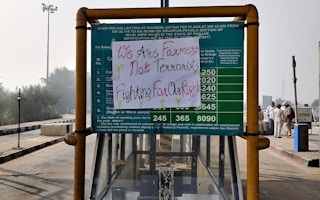Behind the mammoth strike by India’s farmers is pressure at the World Trade Organization (WTO) to cut subsidies to the agricultural sector, the mainstay of the country’s economy, say experts in the field.
Biswajit Dhar, professor of economics at the Centre for Economic Studies and Planning, Jawaharlal Nehru University, New Delhi, tells SciDev.Net that there is a “strong link between the farmers’ struggle and demands made to India at the WTO by the US, EU and other developed countries, to dismantle subsidies and public sector grain stocking”.
“Essentially, developed countries like the US and EU subsidise agriculture to exploit global markets while India and other developing countries use subsidies and public food stocking to ensure domestic food security and livelihoods,” says Dhar, author of a paper on agriculture subsidy regime of the WTO released in February.
In his paper, Dhar discusses the domestic support regime under the Agreement on Agriculture (AoA) — a WTO treaty negotiated during the Uruguay Round of the General Agreement on Tariffs and Trade, in force since January 1995. He compares AoA implementation by the US and EU, the two largest providers of farm subsidies, to that by India.
The US, the largest provider of subsidies, spent more than US$131 billion on domestic support in 2017. Dhar says between 1990 and 2019 the US kept farm-gate prices for wheat, cotton and corn substantially below economic costs of production and below international prices, even incurring significant losses in the process. Meanwhile, the EU share of domestic support moved from 21 per cent in 1995 to 83 per cent in 2017—2018.
India, in contrast, has long used the subsidy allowed by the AoA to build a public distribution system (PDS) to ensure food grain access to people living below the poverty line. When India expanded the distribution system through the 2013 Food Security Act to cover two-thirds of India’s 1.2 billion people, protests were heard at the WTO.
“India and other developing countries must demand amendments to the AoA to allow subsidies to prioritise food security and rural livelihoods,” says Dhar. “Food subsidies are seen as going against WTO principles which focus on trade and there is nothing in the AoA to prevent agribusiness from influencing governments to abandon production-related subsidies and public stocking for food security.”
In September 2020, the business-friendly government of Prime Minister Narendra Modi rushed three new laws through Parliament, seeking to deregulate India’s agriculture and bring it more in line with the global trading system.
Since then farmers have been on nationwide strikes demanding repeal of the laws, which they believe will dismantle the PDS and do away with subsidies in the form of a minimum support price for their produce.
On 21 January, the government offered to suspend the three laws for a period of 18 months, but this was rejected by the farmers. Tens of thousands of farmers have been camping outside the borders of Delhi for almost three months, vowing not to budge until the three laws are repealed.
The new laws allow corporations to buy land and stock agricultural commodities and gain better control over prices. Importantly, they can bypass local markets where farmers are now guaranteed a minimum support price, giving them protection against market fluctuations.
On 9 February, reacting to criticism of the new farm laws, Modi told Parliament that the minimum support price system was not being abolished, but it was necessary to bring about changes to India’s agricultural system. “We are in the 21st century and can’t have 18th-century thinking. We will have to change. No one wants farmers to be stuck in a cycle of poverty.”
Devinder Sharma, a food security expert and founder of Kisan Ekta (Farmers’ Unity) says the Indian farmers’ agitation may be the last chance to change the AoA. “If the farmers succeed in getting the government to strengthen the MSP system, it may actually compel the WTO to shift from the ideal of trade competitiveness to ensuring that the livelihoods of farmers the world over are protected,” says Sharma.
“Across the globe, farmers continue to suffer the consequences of keeping farm-gate prices artificially low so as to keep the economic reforms viable. India’s striking farmers understand this and that is why they are resisting the new laws.
“
Across the globe, farmers continue to suffer the consequences of keeping farm-gate prices artificially low so as to keep the economic reforms viable. India’s striking farmers understand this and that is why they are resisting the new laws.
Devinder Sharma, food security expert and founder, Kisan Ekta (Farmers’ Unity)
“The reality, as borne out by Dhar’s study, is that the massive agricultural support that the US, EU and other developed countries provide for commercially important farm commodities is what is distorting international prices, rather than India’s system of subsidies that protects small farmers and provides food security.”
UN Special Rapporteur on the right to food, Michael Fakhri is among those demanding an end to the AoA. He says the current trade system treats food security as an exception and commercial transactions as the rule while ignoring the right-to-food perspective.
In his report to the 75th session of the UN General Assembly in September 2020, Fakhri said: “The existing rules need to change, but there are disagreements and bitter divisions about what needs to be changed and how. It is unlikely that WTO members can overhaul the Agreement on Agriculture to meet long-standing claims for equity. The Agreement should therefore be wound down.”
This article was originally published on SciDev.Net. Read the original article.










